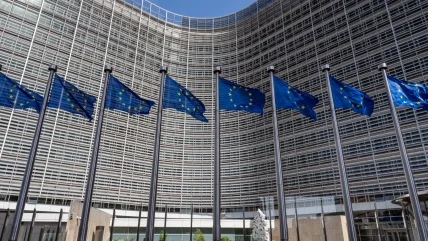
The European Union (EU) has imposed a €500m fine on Apple and a €200m fine on Meta, marking the first penalties under the new Digital Markets Act (DMA) aimed at regulating major technology companies. These actions may heighten tensions with the US, as President Donald Trump threatened tariffs against nations penalising US firms. Trump’s administration labelled the fines as “economic extortion,” reported Reuters.
The European Commission’s year-long investigation revealed that Apple violated the DMA’s anti-steering rules, while Meta breached regulations by not offering consumers a choice of services that use less personal data. These fines underscore the EU’s commitment to enforcing the DMA, despite Trump’s earlier vow to protect US companies from what he termed “overseas extortion.”
“Apple and Meta have fallen short of compliance with the DMA by implementing measures that reinforce the dependence of business users and consumers on their platforms,” said EC clean, just and competitive transition executive vice-president Teresa Ribera. “As a result, we have taken firm but balanced enforcement action against both companies, based on clear and predictable rules. All companies operating in the EU must follow our laws and respect European values.”
Google and Elon Musk’s X face investigation by EU regulators
Other tech giants like Alphabet’s Google and Elon Musk’s X are also under scrutiny by EU regulators and could face similar penalties. A recent US court ruling found Google guilty of monopolising online advertising technology markets, potentially influencing US antitrust actions against the company.
Apple has announced plans to contest the EU’s decision. “Today’s announcements are yet another example of the European Commission unfairly targeting Apple in a series of decisions that are bad for the privacy and security of our users, bad for products, and force us to give away our technology for free,” said Apple in an emailed statement.
Meta also expressed dissatisfaction. “The European Commission is attempting to handicap successful American businesses while allowing Chinese and European companies to operate under different standards,” said Meta’s chief global affairs officer, Joel Kaplan. “This isn’t just about a fine; the Commission forcing us to change our business model effectively imposes a multi-billion-dollar tariff on Meta while requiring us to offer an inferior service.”
The EU competition authority has mandated that Apple eliminate restrictions that prevent app developers from directing users to cheaper deals outside the App Store. Meanwhile, Meta’s “pay-or-consent” model, introduced in November 2023, was found to breach the DMA until it was revised in November 2024 to limit personal data usage for targeted advertising. This model allows Facebook and Instagram users to either consent to data tracking for a free, ad-supported service or pay for an ad-free experience. Meta is currently negotiating with the EU to ensure the revised model complies with DMA regulations. Both companies have two months to adhere to the orders or face daily fines.









